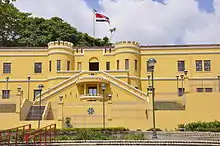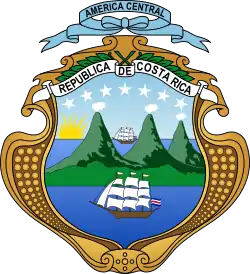Public Force of Costa Rica
The Public Force of Costa Rica is the country's law enforcement force, which performs policing and border patrol functions.[1]
| Public Force of Costa Rica Fuerza Pública de Costa Rica | |
|---|---|
| Agency overview | |
| Formed | 1996 |
| Jurisdictional structure | |
| Operations jurisdiction | Costa Rica |
| General nature | |
| Specialist jurisdictions |
|
| Operational structure | |
| Parent agency | Ministry of Public Security |
| Child agency | |
| Notables | |
| Anniversary |
|
| Website | |
| fuerzapublica.go.cr | |
History

On December 1, 1948, President José Figueres Ferrer of Costa Rica abolished the military of Costa Rica after achieving victory in the civil war that year.[2] In a ceremony in the Cuartel Bellavista, in the capital San José, Figueres broke a wall with a mallet symbolizing an end to Costa Rica's military spirit.[3]
In 1949, the abolition of the military was introduced in Article 12 of the Constitution of Costa Rica.[4] The budget previously dedicated to the military is now dedicated to security, education and culture. Costa Rica maintains Police Guard forces.
The museum Museo Nacional de Costa Rica was placed in the Cuartel Bellavista as a symbol of commitment to culture. In 1986, President Oscar Arias Sánchez declared December 1 as the Día de la Abolición del Ejército (Military abolition day) with Law #8115. Unlike its neighbors, Costa Rica has not endured a civil war since 1948. Costa Rica maintains small forces capable of law enforcement, but has no permanent standing army.
Public Force of the Ministry of Public Security (1996)
In 1996, the Ministry of Public Security established the Fuerza Pública or Public Force, a gendarmerie which reorganized and eliminated the Civil Guard, Rural Assistance Guard, and Frontier Guards as separate entities. They are now under the Ministry and operate on a geographic command basis performing ground security, law enforcement, counter-narcotics, border patrol, and tourism security functions. The Costa Rica Coast Guard also operates directly under the Ministry.[5]
Outside the Fuerza Pública, there is a small Special Forces Unit, the Unidad Especial de Intervencion (UEI) or Special Intervention Unit, an elite commando force which trains with special forces from around the world, but is not part of the main police forces. Instead it is part of the Intelligence and Security Directorate (DIS) which reports directly to the Minister of the Presidency. About 70 members strong, it is organized along military lines, although officially a civilian police unit.
Its motto is "God, Fatherland, and Honor." Commissioner of Police Juan José Andrade Morales serves as its current Commissioner General.
Equipment
Handguns, shotguns and submachine guns
 SIG Sauer P226 – 9×19mm Parabellum
SIG Sauer P226 – 9×19mm Parabellum Smith & Wesson Model 5906 – 9×19mm Parabellum
Smith & Wesson Model 5906 – 9×19mm Parabellum M1911 – .45 ACP
M1911 – .45 ACP Beretta M9 – 9×19mm Parabellum
Beretta M9 – 9×19mm Parabellum IWI Jericho 941 – 9×19mm Parabellum
IWI Jericho 941 – 9×19mm Parabellum Taurus FS 92 – 9×19mm Parabellum
Taurus FS 92 – 9×19mm Parabellum Glock 17 – 9×19mm Parabellum
Glock 17 – 9×19mm Parabellum Benelli M4 Super 9018 – .5x76mm 12 gauge
Benelli M4 Super 9018 – .5x76mm 12 gauge Heckler & Koch MP5 – 9×19mm Parabellum
Heckler & Koch MP5 – 9×19mm Parabellum Beretta Model 38 – 9×19mm Parabellum
Beretta Model 38 – 9×19mm Parabellum IMI Uzi \ Mini-Uzi – 9×19mm Parabellum
IMI Uzi \ Mini-Uzi – 9×19mm Parabellum
Assault rifles
 M16A1 rifle – 5.56x45mm NATO
M16A1 rifle – 5.56x45mm NATO M4 carbine – 5.56x45mm NATO
M4 carbine – 5.56x45mm NATO SIG 556 – 5.56x45mm NATO
SIG 556 – 5.56x45mm NATO IMI Galil
IMI Galil.svg.png.webp) FN FAL – 7.62x51mm NATO
FN FAL – 7.62x51mm NATO M14 rifle – 7.62x51mm NATO
M14 rifle – 7.62x51mm NATO IWI Tavor TAR-21 – 5.56 mm NATO
IWI Tavor TAR-21 – 5.56 mm NATO
Machineguns
 M60 machine gun – 7.62x51mm NATO
M60 machine gun – 7.62x51mm NATO IMI Negev – 5.56x45mm NATO
IMI Negev – 5.56x45mm NATO Browning M2 – .50 BMG
Browning M2 – .50 BMG
Sniper rifles
Grenade launchers
References
- "Costa Rica 1949 (rev. 2011)". Constitute. Retrieved 28 April 2015.
- El Espíritu del 48. "Abolición del Ejército". Retrieved 2008-03-09. (Spanish)
- "Historia militar de Costa Rica revive con los 100 años del Cuartel Bellavista". La Nación, Grupo Nación (in Spanish). Retrieved 2018-09-04.
- "Air Advisors conduct first-ever BPC mission in Costa Rica". U.S. Air Force. Retrieved 2018-09-04.
- "Servicio Nacional de Guardacostas". Ministerio de Seguridad Pública Costa Rica (in Spanish). Retrieved 25 May 2020.
External links
- Fuerza Pública de Costa Rica.
- Ministerio de Seguridad Pública.
- El Espíritu del 48: Abolición del Ejército A brief history of the abolition of the military in Costa Rica.
